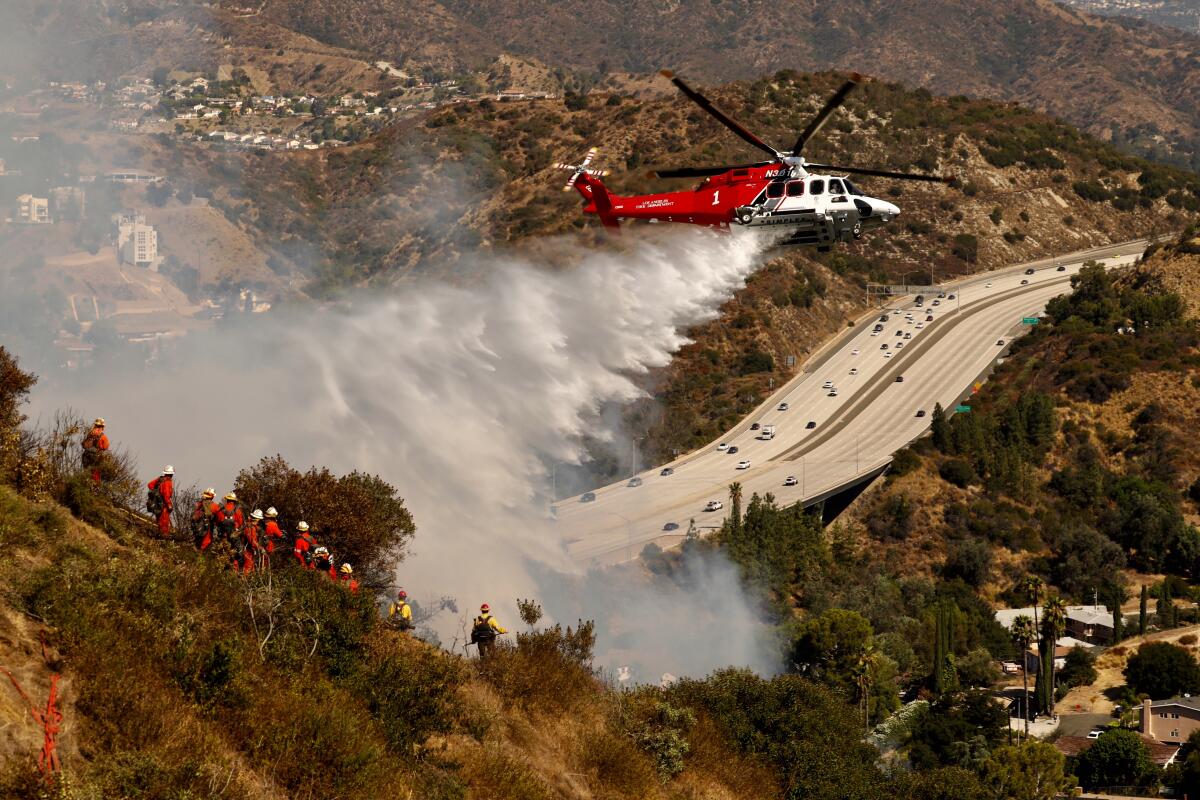Man who started fire in homeless encampment gets mental health treatment, no prison time

- Share via
A man who ignited a 2019 brush fire when he threw a lighted firework into a homeless encampment was spared from prison by a judge Wednesday.
Daniel Nogueira, 28, faced the possibility of more than a decade behind bars for starting the blaze. But Los Angeles County Superior Court Judge Kerry White agreed with Nogueira’s attorney that the case should be resolved by placing Nogueira into a mental health treatment program.
The attorney, Alan Jackson, had argued that Nogueira has attention deficit hyperactivity disorder, commonly referred to as ADHD, and that the condition makes it difficult for him to control his impulses.
Greg Risling, a spokesman for the Los Angeles County district attorney’s office, said prosecutors had opposed the idea of diverting Nogueira’s case because they believed he posed an “unreasonable risk of danger to public safety.”
Jackson acknowledged during a court hearing Wednesday that Nogueira used “extremely bad judgment” when he threw the firework, which prosecutors also described as “a mortar,” out a car window as he rode down Colorado Boulevard in Eagle Rock in August 2019. But Jackson claimed Nogueria was merely engaged in “horseplay” and did not intend to set a fire.
The firework exploded in a large homeless encampment beneath the 2 Freeway, starting a fire that quickly grew to 45 acres as it burned brush made tinder-dry by months of summer heat. Residents were forced to evacuate as the flames threatened about 100 homes in L.A. and Glendale, and sections of the 2 and 134 freeways were closed as fire department helicopters dumped water on the blaze. Two residents of the encampment and a Los Angeles firefighter suffered minor injuries.
White chastised Nogueira for his behavior, adding that he was fortunate to benefit from a 2018 law that allows judges to divert the cases of some mentally ill defendants if they find the illness was a significant factor in their crime.
“What you did was extremely dangerous and not too bright,” White said. “Five years ago, you would have been placed on probation or you would have gone to county jail.”
Nogueira’s lack of criminal record was also a factor in the judge’s decision to spare him from jail, White said. He will enter a guilty plea at a future hearing, but his sentencing will be suspended while he is in a treatment program that could last up to two years, Jackson said.
If Nogueira abides by the program, the case will be dismissed upon completion of treatment and he will have no criminal record, Jackson said.
The decision frustrated advocates for homeless people. Jennifer Hark Dietz, the CEO of People Assisting The Homeless, said it was particularly troubling given recent attacks on homeless people in New York City and Washington, D.C.
“I think the concern could be that other folks might feel that they can get off as well,” she said. “It kind of increases the stigma that, being homeless, you’re unworthy of the attention of justice.”
Daniel Nogueira did not speak during Wednesday’s hearing. His father, Michael Nogueira, who is president of Eagle Rock’s Chamber of Commerce, has not responded to requests to comment about the incident.
Weeks after the fire, Daniel Nogueira and Brian Antonio Araujo Cabrera were initially arrested on suspicion of attempted murder, but prosecutors sent the case back to the Los Angeles Police Department for further investigation. Arson and assault charges were filed against Nogueira last year, and no charges were filed against Araujo because of insufficient evidence.
The fire was the first in a series of arson attacks that stoked fears in L.A. County’s sprawling homeless communities. In a six-week span from late August to early October of that year, tents were set ablaze and homeless people said they also had explosives thrown at their dwellings in Glendale, Echo Park and Skid Row.
Three homeless people were killed in the fires — two of which police said were set by other unhoused people — but the attacks raised concerns that people frustrated with homelessness in L.A. County were attacking encampments.
Last year, a Times review of Los Angeles Fire Department data found that the number of fires related to homeless encampments in the city tripled from 2018 to 2020.
Mel Tillekeratne, the founder of a mobile shower program that aids encampments throughout L.A. County, said Nogueira was being given treatment and leniency not often shown to the city’s homeless.
“When we’re looking at our homeless population, there’s so many people who are suffering from mental illness who he assaulted, people who never got the chance that he got,” Tillekeratne said. “What does that say about our justice system? What does that say about how we look at our unhoused population?”
More to Read
Sign up for Essential California
The most important California stories and recommendations in your inbox every morning.
You may occasionally receive promotional content from the Los Angeles Times.














